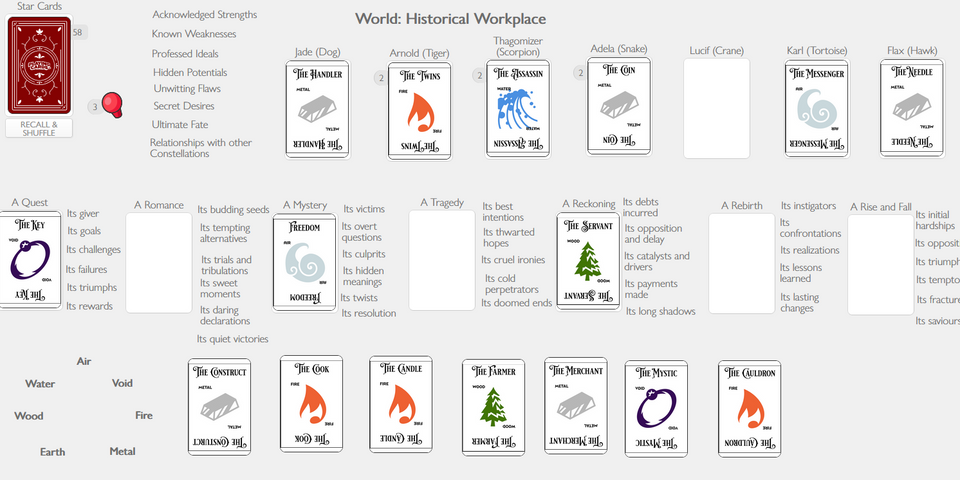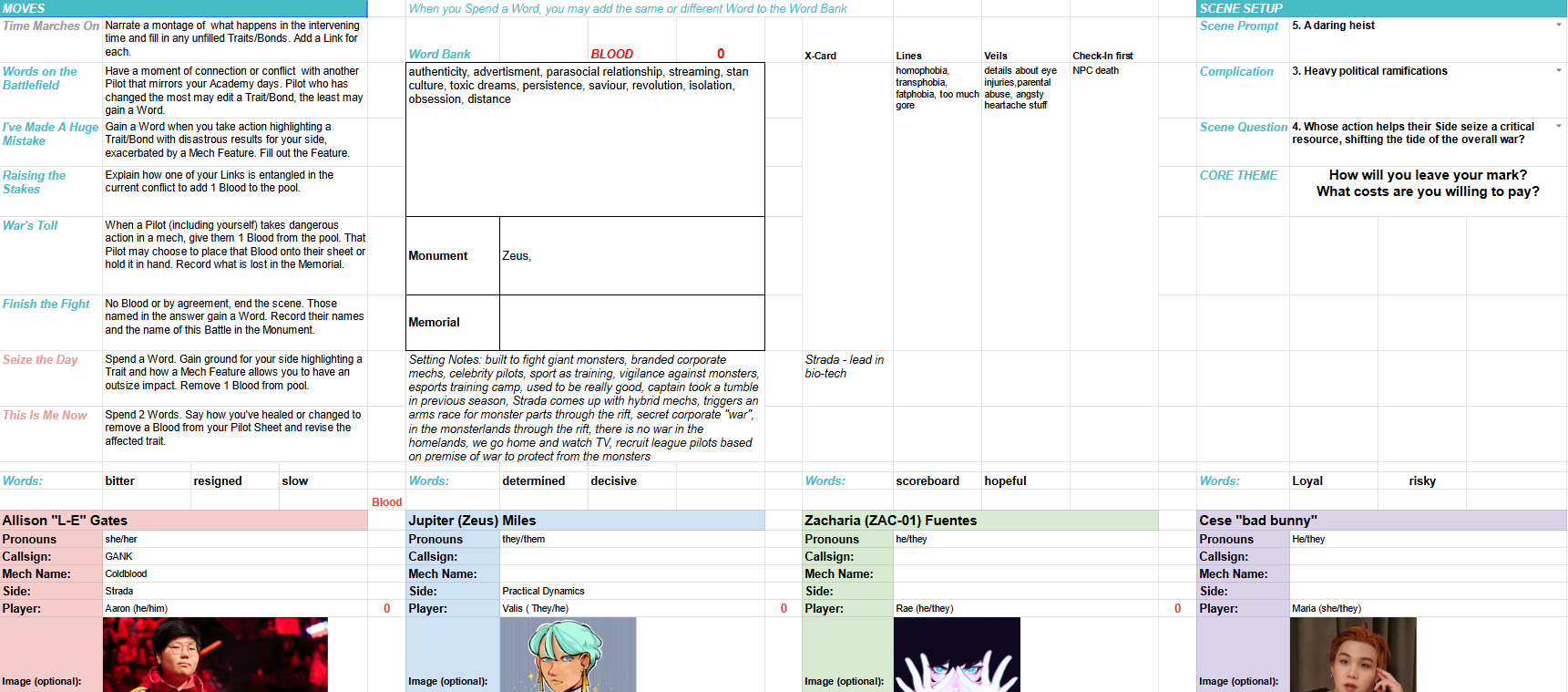Structured Conversations

Happy Friday, pots and pans!
I've been doing a bunch of playtesting since the last newsletter, which has been good! I've just done two sessions of a Spectres of Brocken playtest that was incredibly helpful, and will aim to wrap that up with the third session. I'm planning to revert the main Word-gaining move in the Academy Phase to its previous version, and make some adjustments to how scenes are set up, particularly in how and when the question prompts are chosen. I've also got my eye on the move options you have for adjusting traits in the Conflict Phase and will be brainstorming ways to tweak that once we get through the third session.

I've also just managed to playtest a new iteration of the card mechanics for Aaron Lim's Infinite Seas Under The Same Stars at Playtest Zero. I shifted from drafting cards from a dwindling pool of cards to drafting them from a replenishing pool. However, this means I'll have to break the symmetry of using 7 items for most of the game mechanics since 7 cards in the pool might be too many. I also tried out an enforced turn order, and changed the way the prompts interacted with the element wheel and also had to adjust the way the player actions worked to fit with the other changes. This might actually be one too many changes to test at once, but I did get a decent feel for how a round plays out in this new regime.
I also ended up playtesting two Descended From The Queen games by other designers this week, which was also really helpful in prompting reflection on the different approaches I've been using in both Spectres of Brocken and Infinite Seas Under The Same Stars for ordering a conversation (using a turn structure, discrete choices/actions, moves etc.).
In Spectres, there's a feeling of "looseness" in the overall structure of the scenes since you don't have a lot of steps set out in how you play out a scene. It's also kinda front-loaded. You start by choosing two prompts to set up a scene and then picking a question to be the main aim of the scene and also act as a limit on the scene (by working to answer the question) but then there's not that much else.
However, there's some friction with the Moves having quite varied yet specific triggers and outcomes within the loose frame of the scenes, which might lead to situations where you're not sure what to aim for in a scene since there are so many different options from the moves but not an overarching goal. I put the Core Themes of "Who am I? What do I want?" to guide the Academy Phase but haven't really built that into the procedure of play so they kinda just sit there as a reminder without really engaging with the other mechanisms.
I enjoy having the looseness of the scenes, but find myself often having to remind playtesters when they've triggered a move or pointing out when a move might actually apply. This works easier in a GM-ed game or when there's something like Dream Askew's setting elements to put players into the "GM-full" mode of pulling on the mechanical systems for all players rather than just focusing on their own character.
I think this is a big issue that I want to tackle in the next iteration of Spectres, and I don't think it's a matter of adjusting the moves being used within this structure (though they do need work as well!) but thinking more about how this structure could be adjusted to better serve the conversation flow. I'm thinking of mid-loading some structure, like having the scene question(s) asked in the middle of the scene after some establishment has happened or using the Core Themes as part of the scene structure or moves.
On the other side of things, Infinite Seas hasn't always had a strict turn order, but has always felt more structured because you are always picking from a list of discrete actions when you do something since it always has to tie into picking a card and doing something with it. I think I went a little too far with the strict turn structure in the latest playtest, and want to provide some opportunity for stretching what can be done within a player turn in the future.
I have noted that when the turns feel more structured, you need some extra prompts to help loosen up the player stances or nudge towards some more free discussion otherwise you get a lot of "problem solving/addressing" mode. This is of particular concern for Infinite Seas since I want to get invested in different expressions of a character's core traits and getting into messy but deep entanglements with other characters in each life. Part of the changes I'm looking into for the next version is to spruce up the character traits, but also to bring in some of that looseness in the turns.
It's been really good to learn more about how turn and action structures shape the play experience as I've developed these two games, and it's given me a lot of appreciation for the design decisions around them in games that I love.
I know I haven't synthesized any useful theory or conclusions around them, but I'm enjoying working through the process and trying to internalize them from this practice into experience for future games. Most of my advocacy for letting new designers reinvent wheels is because I really get a lot out of working through these problems rather than applying procedures I don't fully understand enough to know when to adjust.
I hope you have some patience with me as I work through it in these newsletters as well, heh. Until next week then.
Turn-based regards,
Aaron
